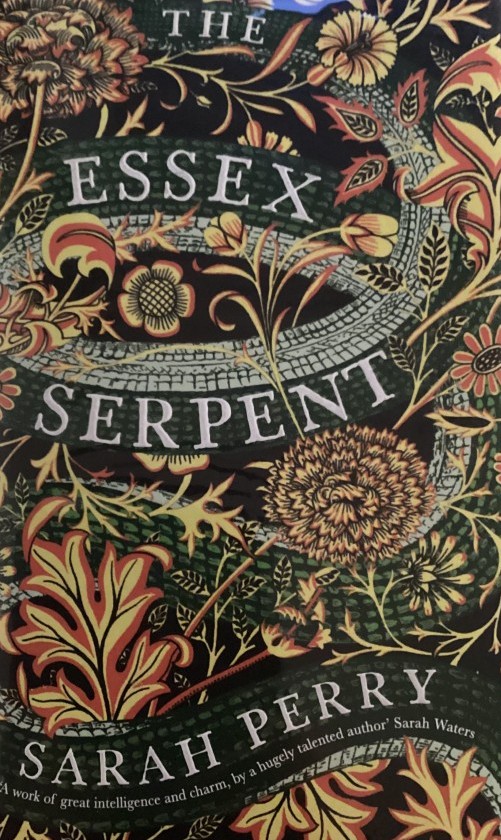Inspiring Older Readers
 posted on 04 Jan 2024
posted on 04 Jan 2024
Running aground with The Essex Serpent
If, like me, you are a ‘chain-reader' moving seamlessly from book at book, you’ll be aware of the distress that comes with the failure to find the ‘right’ read to settle down with. There are plenty of reasons why you can fail to connect with the book you pick up to read next - maybe the over-powering shadow of the previous one still looms; maybe your choice is too similar to the last one; or, maybe, the book you’ve picked up suddenly seems too long, too short, too austere, too frivolous. Whatever the cause of your dithering you keep chopping and changing until, finally, you discover the one that fills the void.
These are emotions I’m very used to and I’ve devised my own strategies to overcome difficulties in crossing the bridge from one book to the next. But there is an even more insidious threat for the would-be reader - what happens when you find yourself well into a book (let’s say 100 pages into a 350 page volume) and suddenly you just come to a halt. The pages, however many you feel you’re turning, never seem to get any fewer, the plot seems to be jogging on the spot, you open and close the book without being able to build any sense of momentum. Essentially you’re circling around like water in a sink, moving in ever decreasing circles as you head for the plughole. Soon, there’s no option but to slam the book shut, rather guiltily slip it back on the shelf and tell yourself that you’ll come back to it when you are ‘ready’ - whatever ‘ready’ means.
It might seem that the answer is simple - maybe it just isn’t a very good book or maybe it’s just one that’s not to your particular taste. But I suspect that there's something a bit more complicated going on. Let me give you a specific example: The Essex Serpent by Sarah Perry.
I came to the book following several recommendations from people whose views on books I respect and who are usually reliable when it comes to spotting a worthwhile read. It’s also a book that has had a stream of admiring reviews from the professionals paid to offer up critical assessments. Let me offer you a typical example from M. John Harrison writing for The Guardian:
“The Essex Serpent….is fully acted out. Fertile, open, vocal about its own origins and passions, crammed with incident, characters and plot, it weighs in at a sturdy 441 pages. It is a novel of ideas, though its sensibility is firmly, consciously, even a little cheekily, gothic.”
It should be just my cup of tea. And, for just over one hundred pages, it was. But then, without warning, I suddenly had that creeping feeling of dread. Why was I running on the spot, reading fewer and fewer pages, seemingly getting nowhere and becoming increasingly fractious with plot and character? What had gone wrong?
There I was circling the plughole, heading inevitably for that moment when I would shut the book, slip it back on the shelf and tell myself I’d give it another go at a later date.
Was this about the book or was it about me? I really don’t know. But what I do know is that the older I get the less patience I have to persist with reading when a book has lost its sparkle for me. I also know that the constant lure of the next book on the reading pile makes me fidget when I feel that I’ve lost momentum with what I’m reading. And, I also know that I’ve become absurdly hyper-critical and if a book doesn’t quite match up to my needs at that moment, I’m prepared to ditch it.
There was a time when I’d make myself continue reading books that I thought I should have tucked away in my back catalogue - I even had moments when I thought that perhaps books weren’t doing me any good unless they were hard work. But no longer. Now I just move on.
But none of that quite explains why it is that we sometimes seem to run aground with books when we think we should be enjoying them. I suspect books and readers have their moment: What I mean by that is a reader often finds a book when they’re ready for it, when book and reader resonate on the same wavelength. Come to it too early or too late and you’re ships in the night gliding past each other. There are plenty of books and authors that I tried to read when I was younger and found them impossible to get on with - Joseph Conrad for example - and in my later years I now think of as essential. Equally, books I once loved I often find impossible or disappointing to go back to ( I won't say which because I may change my mind again!). The point is that there are moments of synchronicity when a book is the right one and there are times when you pick up a book that you're not emotionally or temperamentally in the right place to enjoy.
Will I ever find the right moment for The Essex Serpent? Will I ever return to it? Who knows. It’s not the book’s fault and it’s not mine: this just wasn’t our moment together.
Terry Potter
January 2024